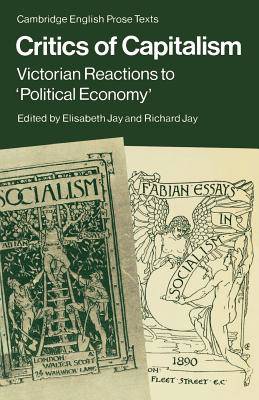
- Retrait gratuit dans votre magasin Club
- 7.000.000 titres dans notre catalogue
- Payer en toute sécurité
- Toujours un magasin près de chez vous
- Retrait gratuit dans votre magasin Club
- 7.000.0000 titres dans notre catalogue
- Payer en toute sécurité
- Toujours un magasin près de chez vous
Critics of Capitalism
Victorian Reactions to 'Political Economy'
92,45 €
+ 184 points
Description
By the start of the Victorian period the school of British economists acknowledging Adam Smith as its master was in the ascendancy. 'Political Economy', a catch-all title which ignored the diversity of viewpoints to be found amongst the discipline's leading proponents, became associated in the popular mind with moral and political forces held to be uniquely conducive to the progress of an increasingly industrialised and competitive society. 'Political Economy' served in turn as the focus for critics of equally diverse moral and political persuasions, who sought to challenge the materialism of contemporary society and offer their own assessments of the profound social changes of the time. In the introductory essay to the collection of readings from such 'critics of capitalism', the editors review the principles of the early economists, the way in which these principles were appropriated and applied by their Victorian successors and the contrasting modes which critics of popular economic ideas assumed. Subsequent extracts from the writings of the Owenite Socialist John Bray, Carlyle, Marx and Engels, J. S. Mill, Ruskin, Arnold, T. H. Green, William Morris and G. B. Shaw, demonstrate both the breadth of the possible grounds for ideological opposition to the prevailing philosophy and the shifting nature of the debate as 'Political Economy' itself was revealed as incapable of explaining or responding to the changing conditions of the 1870s. Headnotes to the extracts describe the genesis of individual debate and discuss distinctive stylistic features. Annotation in the form of footnotes and endnotes has been designed to gloss obscure allusions and arguments. In making more accessible the socio-economic writings of those authors now better known for their imaginative work, this volume will enable readers to reach a more profound appreciation of the central role such work played in developing the moral vision embodied in their more lastingly popular books and essays.
Spécifications
Parties prenantes
- Editeur:
Contenu
- Nombre de pages :
- 280
- Langue:
- Anglais
- Collection :
Caractéristiques
- EAN:
- 9780521319621
- Date de parution :
- 30-01-87
- Format:
- Livre broché
- Format numérique:
- Trade paperback (VS)
- Dimensions :
- 141 mm x 217 mm
- Poids :
- 403 g

Les avis
Nous publions uniquement les avis qui respectent les conditions requises. Consultez nos conditions pour les avis.





